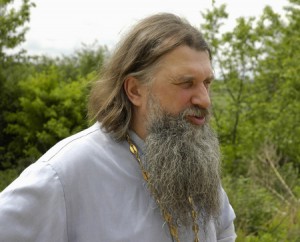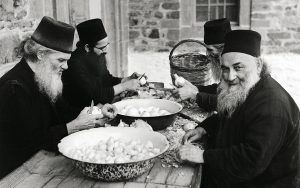 Father Alexander Volokhov is the rector of the Nikitskaya church of the Domodedovsky deanery. We’ve asked Fr Alexander to share his thoughts on how Great Lent should be observed.
Father Alexander Volokhov is the rector of the Nikitskaya church of the Domodedovsky deanery. We’ve asked Fr Alexander to share his thoughts on how Great Lent should be observed.
Father Alexander, we are in Great Lent now. What are the most important things we should remember during this period?
– Lent is a sacred time; atime to reflect upon our ‘usual’ routine of life. We must say ‘enough’ to how we have been living up till now and start focusing and living for all that is spiritual, not seeking or expecting any reward from this. If I could, I would run off into the forest for the whole period of Great Lent with my Psalter and a hunk of bread to ‘escape’ my usual life routine but this is not spiritually edifying or helpful. I have responsibilities towards my parish, wife, children and my health. Sitting in seclusion in the forest would not necessarily teach me to pray so my Lenten desire is one of renewed ascetical and solitary focus.
What needs to be done to make spiritual growth happen so that the fasting isn’t confined solely to the abstinence from a certain type of food?
– During Great Lent, I always recollect a story about prelate Mitrophan of Voronezh. He had a lay brother, whom he loved very much. One day, before the end of Great Lent, as he was heading for his cell in the monastery, he caught a strong smell of fish wafting from his lay brother’s cell. The Prelate knocked at the door, entered the cell and saw his lay brother in company with a man, both eating fish soup. He addressed him: ‘Brother, why on earth are you doing this?’.
The monastery was governed by very strict rules and the prelate himself was a strict faster.
His lay brother’s reply was: ‘You see, this man and I come from the same village and he is my childhood friend; we were like a hand fitting into a glove. It’s the first time in 15 years that he’s visited me. He has brought me some fish as a present. I can’t just throw it away and if left uncooked, the fish would rot! That’s why we have cooked fish soup’.
‘Well, if that’s the case, I might as well join you’, answered the prelate. And so he did, not because he was hungry, but because friendship and love was as important as the abstinence from fish during the Great Lent.
Having said that, I don’t think we should break the fast, because if we do what else does there remain to observe? If we have committed ourselves to fasting, let us stick to this commitment, as one can’t have faith without being faithful.
Here is another fasting related story. An acquaintance of mine was having some very serious problems and she frequently travelled to see a spiritual person to seek advice. Once she said to him, ‘I have voluntarily undertaken the obedience of reading two kathismas every day. Do you think I have chosen wisely?’
He asked her, ‘Why exactlytwokathismas? You are having such grave problems in your life! Just take a Psalm book and read it all! Read it again and again! What you are doing now is nothing but spiritual murmuring. If you need to achieve something essential, you should sacrifice for it accordingly. Do you wish for your sacrifice to be of value? Ifthere is no deepsacrifice, how will you show your need and worth for anything big and important, such as a good husband, good health for your children or good living conditions? As you call, so shall the echo reply’.
Her life afterwards did change forthebetter. Any sacrifice one makes, any relinquishment of something very dear to you is not done in vain. Fasting is not about suffering.But if your sacrifice is worth a penny, so shall you receive a penny in return. If you spend much of your time engrossed in reading fiction and only manage to devote fifteen minutes of your time to your Psalm book every now and then, you show yourself as a bibliophile, not an Orthodox Christian.
Lent is the right time for one to change oneself for the better. This is a time when prayers can especially be heard and tears can be appreciated, for God Himself assigned such a time for us. If it was all unimportant, would the Holy Light descend upon us? One can’t live an accustomed, habitual life while fasting; during fasting there occurs a motion, a breakthrough. This is a time in the spiritual life when fruits are borne and they can clearly be seen. It is tempting to think that if one thing fails to be successful, then other things will fail to do well too but it does not happen in this way. Fasting is a covenant with God, when we agree that we want to be part of this covenant. What’sthe point in making an agreement if we break it? What is so difficult about fulfilling a covenant you have chosen to make?
In his wonderful ‘Indian Letters’, St Nicholas Serbian tells us about some Indians travelling across Europe, observing its spiritual life and relating their observations. What they were especially amazed to see was that people in Europe attended church only once a week and said prayers before meals only. So the Indian travellers asked, puzzled, ‘How can it be that Muslims, above whose faith you extol yours, pray five times a day?’. It is equally puzzling that we believe that if a person attends church twice a month and reads the Rule of Prayer, they can be looked up to. There is nothing in fasting that you aren’t able to cope with.
–How must we live through the Holy Week?
Holy Week is the most charged and important time in the life of the Church and a time for us to be closer to Christ, to enter more deeply into His Sufferings and Death. During this time, we should try and live in its fullness these most precious days of the Church’s life.
Thursday, Friday and Saturday of Holy Week are the dearest moments to me because everything – the events and the feelings during this period – are real, with the descent of the Holy Light at its completion. Religion and cult are immaterial, almost ethereal, whereas fasting is tangible as there are many things you can touch. This is a miracle period. Fasting is necessary for one to feel the events, to be able to live through them. These are truly remarkable days.
Translated by Zhanna Menshikova
Edited by Samantha Kessel



















